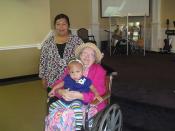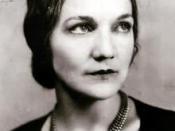Independence against Love Review of Katherine Anne Porteráïs áðThe Jilting of Granny Weatheralláñ IBC 99120010úúÃÂàAs other Katherine Anne porteráïs fictions, such as Flowering Judas (1935), and Pale Horse, Pale Rider (1937), The Jilting of Granny Weatherall also reflects the personal conflict which is quite familiar to contemporary women: a conflicted wish for love and the conventional security belonging to home and family, and a simultaneous desire for an independent identity and free assertion of her personal ideals and talents.
The storyáïs beginning sentence immediately shows us a picture of Granny Weatherall. áðShe flicked her wrist neatly out of doctor Harryáïs pudgy careful fingers and pulled the sheet up to her Chin.áñ(56) Although in her deathbed, she still believed that she could take care of herself. She was feisty with the doctor: áðGet along and doctor your sickáàLeave a well woman alone. Iáïll call you when I want you.áñ(57)
Weak as she was, she still tried to keep her independence and pride.
Then in a semi-conscious state the feisty and cantankerous Granny reviews her life by remembering the important happenings, disappointments, crises, achievements, and feelings. Her character is depicted fully with vivid and rich details. She exemplifies many heroic qualities such as endurance, fortitude, intelligence, and the ability to work unremittingly hard. In her past life she worked as a farmer, doctor, veterinarian, and she has raised her children courageously. Many nights she sat up caring for sick children and sick animals. She was proud of the fact that she never lost a child except for Hapsy, her last born. She wishes that John, her dead husband, could see her children now and that she could see Hapsy. Furthermore, she wishes that the old days were back even though she had a hard time raising her children...

